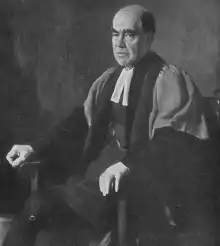Hastings Rashdall
Hastings Rashdall FBA (24 June 1858 – 9 February 1924) was an English philosopher, theologian, historian, and Anglican priest. He expounded a theory known as ideal utilitarianism, and he was a major historian of the universities of the Middle Ages.[5]
Hastings Rashdall | |
|---|---|
 | |
| Born | 24 June 1858 London, England |
| Died | 9 February 1924 (aged 65) Worthing, England |
| Spouse |
Constance (m. 1905) |
| Ecclesiastical career | |
| Church | Church of England |
| Ordained | |
Offices held | Dean of Carlisle (1917–1924) |
| Academic background | |
| Alma mater | New College, Oxford |
| Influences | |
| Academic work | |
| Discipline | |
| Sub-discipline | |
| School or tradition | |
| Institutions | |
| Notable works | The Theory of Good and Evil (1907) |
| Notable ideas | Ideal utilitarianism |
| Influenced | Henry Herbert Symonds |
Biography
Born in Kensington, London, on 24 June 1858,[6] Rashdall was the son of an Anglican priest. He was educated at Harrow[7] and received a scholarship for New College, Oxford. After short tenures at St David's University College and University College, Durham, Rashdall was made a Fellow of first Hertford College, Oxford, then New College, Oxford, and dedicates his main work, The Theory of Good and Evil (1907), to the memory of his teachers T. H. Green and Henry Sidgwick.
The dedication is appropriate, for the particular version of utilitarianism put forward by Rashdall owes elements to both Green and Sidgwick.[6] Whereas he holds that the concepts of good and value are logically prior to that of right, he gives right a more than instrumental significance. His idea of good owes more to Green than to the hedonistic utilitarians. "The ideal of human life is not the mere juxtaposition of distinct goods, but a whole in which each good is made different by the presence of others." Rashdall has been eclipsed as a moral philosopher by G. E. Moore, who advocated similar views in his earlier work Principia Ethica (1903). Rashdall was also a Berkeleyan, believing in metaphysical idealism.
His historical study, The Universities of Europe in the Middle Ages,[8] was described in the introduction to its recent reprinting as "one of the first comparative works on the subject" whose "scope and breadth has assured its place as a key work in intellectual history."
His The Idea of Atonement in Christian Theology surveyed different approaches to the Christian doctrine of atonement, concluding with an influential defence of the "subjective" theory of the atonement that Rashdall attributed to both Peter Abelard and Peter Lombard. Rashdall argued that the "objective" view of the atonement associated with Anselm of Canterbury was inadequate, and that the most authentically Christian doctrine was that Christ's life was a demonstration of God's love so profound that Christ was willing to die rather than compromise his character. This in turn inspires believers to emulate his character and his intimacy with the Father.[9]
Rashdall received the degree Doctor of Letters (DL) from New College, Oxford, in October 1901.[10]
He was president of the Aristotelian Society from 1904 to 1907,[11] a member of the Christian Social Union from its inception in 1890, and was an influential Anglican modernist theologian of the time, being appointed to a canonry in 1909.
He was Dean of Carlisle from 1917 to 1924, and died of cancer in Worthing[12] on 9 February 1924.[13]
Selected works
- Rashdall, Hastings (2010) [1895]. The Universities of Europe in the Middle Ages, 2 vols. in 3 parts. Cambridge: Cambridge University Press [orig. Oxford: Clarendon Press]. ISBN 978-1-108-01813-5.
- Doctrine and Development: University Sermons (1898)
- New College (with Robert Rait, 1901)
- Christus in Ecclesia: Sermons on the Church and Its Institutions (1904)
- The Theory of Good and Evil (1907)
- Ethics (undated)
- Philosophy and Religion (1910)
- Is Conscience an Emotion? Three Lectures on Recent Ethical Theories (1914)
- Conscience and Christ: Six Lectures on Christian Ethics (1916)
- The Idea of Atonement in Christian Theology (London: Macmillan, 1919)
- The Moral Argument for Personal Immortality in King's College Lectures on Immortality (1920)
- God and Man 1930
See also
References
Footnotes
- Jackson & Gilmore 1953, p. 390.
- Rayner 2005, p. 4.
- Rayner 2005, p. 239.
- Rayner 2005, pp. 2, 9.
- Garnett 2004, where Rashdall's The Universities of Europe in the Middle Ages is referred to as "a standard work."
- Garnett 2004.
- "Rashdall, Very Rev. Hastings" 2007.
- "Review of The European Universities of the Middle Ages, by Hastings Rashdall". The Quarterly Review. Vol. 183. April 1896. pp. 445–472. Retrieved 2 October 2019.
- Rashdall 1919, pp. 437–447.
- "University Intelligence". The Times. No. 36589. London. 18 October 1901. p. 4.
- Matheson 1928, p. 115.
- "Dean Rashdall". The Times. No. 43572. London. 11 February 1924. p. 17.
- Matheson 1928, p. 230.
Bibliography
- Garnett, Jane (2004). "Rashdall, Hastings (1858–1924)". Oxford Dictionary of National Biography. Oxford: Oxford University Press. doi:10.1093/ref:odnb/35676.
- Jackson, Samuel Macauley; Gilmore, George William, eds. (1953). The New Schaff–Herzog Encyclopedia of Religious Knowledge. Vol. 9. Grand Rapids, Michigan: Baker Book House.
- Matheson, P. E. (1928). The Life of Hastings Rashdall, D.D.
- Postle, Dorothy; Marsh, Margaret (2000). Hastings Rashdall: Dean of Carlisle, 1917–1924.
- Rashdall, Hastings (1919). The Idea of Atonement in Christian Theology. London: Macmillan and Co.
- "Rashdall, Very Rev. Hastings". Who Was Who. A & C Black. 2007. doi:10.1093/ww/9780199540884.013.U201990. ISBN 978-0-19-954089-1.
- Rayner, Margaret J. (2005). The Theology of Hastings Rashdall: A Study of His Part in Theological Debates During His Lifetime (PhD thesis). University of Gloucestershire. Retrieved 2 October 2019.